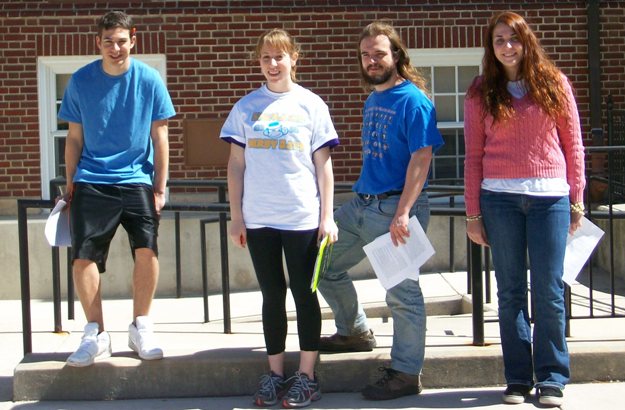
Judgment is Good!
by Rebecca M. Lausch
As the PLA for Professor Christopher Fee’s ENG 312: Medieval Drama, I am proud to announce the class production Judgment is Good. The play is a modern translation of the Medieval liturgical drama The Last Judgment, a piece which comes from a cycle of pageants written and performed by a craft guild in mid-fifteenth century England. The original text tells the Biblical narrative of the last judgment (all Hell breaks loose on Earth when Jesus returns to judge the living and the dead) and the model the class has chosen for translation is a zombie apocalypse: oh yes, we are going there; there will be Thriller. The translation draws upon contemporary issues of corruption in the financial sector as a correlative idiom for the narrative of mass corruption on an Earth devoid of God’s presence. The title of the translation is drawn from a famous speech by Gordon Gekko, Michael Douglas’ character in the 1987 hit film Wall Street (and now the upcoming sequel slated for release in September), in which he makes the statement “Greed is good.” Gekko appears in Judgment is Good as a corrupt banker who has been sentenced to damnation in Hell and he fulfills the role of Satan’s lead head-hunter.
The zombie component enhances the element of translation that deals with the comedy of evil. Comedy of evil proves an incredibly rich and vital hallmark of Medieval liturgical drama. Often employing anachronistic and vernacular references, comedy of evil helped make the Biblical narratives more relatable to the lives of Medieval audiences. At the same time, it reinforced an important contrast between the divinity of Christ and the worldliness of mortals corrupted by Satan’s influence. As is often the case with the zombie apocalypse and other genres of modern horror films, gratuitous exhibition of villainous evils was a common and popular device exploited in Medieval texts like the Wakefield Last Judgment.
My job as PLA has been to enhance both in-class and out-of-class activities with specific attention to the translation process. My main goal has been to help the students engage in a study of dramatic text that goes beyond simply identifying the basic narrative to mining for the important questions the narrative poses and the specific ways a certain community chooses to pose them: aligning the “what” with the “why” and “how.” I would say the biggest challenge we are facing in the translation process is bringing the “why” and “how” components to the modern dramatization in a way that remains true to the Medieval text. Retelling the Biblical narrative of the last judgment is not the difficult task here—posing the specific questions and dramatic devices that resonated with a Medieval audience is the challenge. We are now at the point where we have a working version of the new script and are beginning casting, rehearsals, set construction, etc. Our final performances will take place the weekend of Celebration '10, outside on the back patio and steps of Breidenbaugh. In the meantime, keep checking back for updates and reports and pay no mind to any flesh-eating blood fiends you may chance to encounter roaming the quads after dark…
Dated 04/08/10